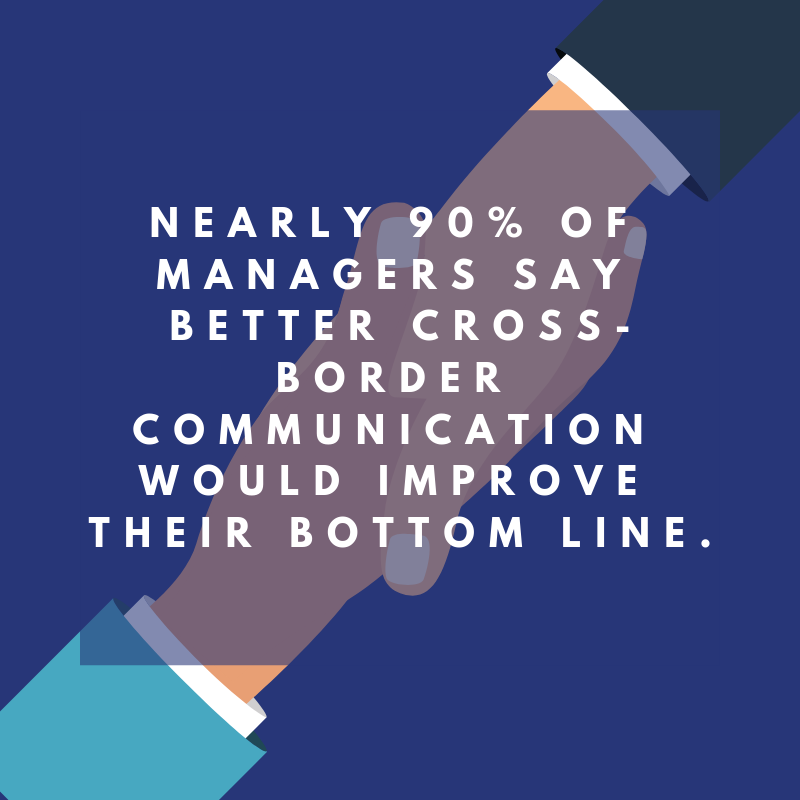![]()
Did you know that three of the world’s five largest economies are in the far east? What about the fact that none of the world’s top 40 nations by population growth rate are in Europe or North America?
MBAs have long been a go-to degree for those looking to hit the “big time” in their careers. Those that want to expose new products to the world, and change industries. As such, many MBAs have begun to tailor their academic programming to where the true economic opportunity is: a rising Asia and a new global middle class.
MBAs have long proven themselves one of the most versatile degrees you can earn. On top of providing versatility and the ability to jump into many roles, MBAs can also help you specialize. In this case, in international management.
International management degrees provide coursework on the complex world of international markets, currency exchange, international logistical issues, the laws and customs of other nations, and marketing to foreign demographics.
If you already know you’re interested in an international management MBA, be sure to check out our ranking of the best online international management MBA degree programs. If you’re trying to determine if an international management MBA is right for you, be sure to read through our guide below.
In this guide we’re going to look at the following topics:
- What is a International Management MBA?
- Can I Get a International Management MBA Online?
- How Do I Gain Admission to a International Management MBA?
- What Can I Do With a International Management MBA?
- How Much Can I Earn With a International Management MBA?
What is a International Management MBA?

International management MBAs are first and foremost traditional master’s in business administration degrees. Secondarily, international management MBAs provide a cluster of topically related courses in international management, generally 3-5 of these courses.
We note international management MBAs are ‘traditional’ MBAs to distinguish between MBAs that have concentrations and executive MBAs. While executive MBAs are also a stellar degree choice, they do not offer specializations such as international management.
Executive MBAs generally have the additional requirement that students have worked in managerial roles for 5 or more years. These programs start with more advanced concepts and take less time to complete. Often not leaving time for a specialization.
When pursuing an international management MBA, students should know that a great deal of their course work will be similar no matter the program they pursue. Core courses within MBA programs are often very similar across schools.
Common core courses include:
- Marketing Management
- Leading Teams or Project Management
- Human Resouces
- Financial Accounting
- Operations Management or Logistics
- Microeconomics for Management
- Strategic Thinking
- Managerial Accounting
- Data Analytics
- Managerial Finance
Once students have worked through a majority of the programs core courses, they will start in on their specialization courses. Unlike core courses within MBAs, specialization courses can vary quite a bit between programs. If there are specific topics you would care to have covered in your international management MBA, be sure to closely check the curriculum of schools you are interested in.

Some common specialization courses within international management include:
- International Accounting
- International Financial Management
- International Operations Management
- Global Business Strategy
- International Law
- International Markets
- International Human Resources Management
Additionally, many international management MBAs also offer opportunities to study abroad and even work in the region in which you would like to specialize.
One way to compare the concentration courses of programs you may be interested in is to take a look through MBACentral’s top picks for online international management MBA degree programs. Check out our ranking here.
Can I Get an International Management MBA Online?
The short answer is an unequivocal yes. A majority of MBA programs are offered fully or partially online. Additionally, many business schools were early adopters of online education to cater to their adult and working student populations. This means that many MBA programs have had years to hone cutting edge delivery methods and online support services.

For many students seeking an MBA, however, this is the first time they’re considering an online education. While many students find online to be a great delivery method for courses, there are some definite “pros” and “cons.”
Some of the most common positives related to taking courses online include:
-Paying lower fees than in-person programs
-The ability to complete school work around your current job
-No need to move to the location of the program
-Asynchronous courses offering the ability to join in on a class at any time
Some of the most common negatives related to taking courses online include:
-Less support and a greater need to be a ‘self-starter’
-Trouble meeting classmates or professors
-Less access to on-campus networking and support events
Which is to say that no one-degree program or delivery method is perfect. But depending on your priorities you should be able to find a program that works well for your needs.
One additional note related to international management MBAs is that many programs offer the ability to study abroad. If this is important to you, this will be one portion of the program — at least — that requires in-person travel.
If you think you might be interested in an online international management MBA, make sure to check out our ranking of the best online international management MBA degree programs. If you’re still trying to determine if an international management MBA is right for you, be sure to read through our guide below.
How Do I Gain Admission to a International Management MBA?
Admissions to international management MBAs are similar to admissions for all MBA programs.
Generally speaking, the following elements are required for admission to an MBA:
- Arrangements for funding the program
- GMAT Scores
- Transcript(s)
- A statement of purpose and application essays
- References
Working our way through the above elements, arrangements for funding the program should be considered early on in your application process. While some MBA programs (particularly online MBAs) can be quite affordable, others can be very expensive. It’s important to ascertain if the price of a program is doable, and for many students this can be a major factor when narrowing down on what programs to apply to.
Filling out a federal financial aid application (FAFSA) grants you eligibility to take out federal student loans up to the price of an MBA program offered by a regionally accredited institution. Federal student loans have additional safeguards and — often — lower interest rates than private student loans.
Other routes to obtaining funding for an MBA include you paying out of pocket, an employer paying for the program, and scholarships. A wide range of scholarships is available based on where you work, what region you live in or membership to professional organizations.

Secondly, for many MBA programs, you’ll need to plan to take the GMAT. If standardized testing “isn’t your thing” or you would rather avoid the inclusion of a GMAT score in your application, then take heart in the fact that more and more schools are doing away with the GMAT requirement. Some schools are now allowing students to submit any type of graduate school admissions score (including LSAT or GRE), while others have done away with a standardized test requirement in totality.
For a ranking of the top no-GMAT MBA programs, be sure to check out our ranking of the best no-GMAT MBAs today!
Transcripts are required for admission to all MBAs. These will be used to verify that you hold a bachelor’s degree from a regionally accredited university. Some schools have additional undergraduate GPA requirements. Common GPA requirements include requiring a 3.0 or higher GPA in undergraduate, or for more competitive programs a 3.25 GPA.
A statement of purpose and application essays will be familiar to many students from their time applying to undergraduate programs. These requirements are meant as a place for you to present your case for why you should gain admission to an MBA program.
Finally references serve as a way to verify you have work experience and to showcase any other skills or experiences you may have. References from alumni or the program you are trying to gain entry to can be particularly compelling.
If you think you might be interested in an online international management MBA, be sure to check out our ranking of the best online international management MBA degree programs. If you’re still trying to determine if an international management MBA is right for you, be sure to read through our guide below.
What Can I Do With an International Management MBA?
There are a wide range of careers one can pursue with an international management MBA. Potential students should note that — at it’s heart — an international management MBA is primarily an MBA degree. MBAs are some of the most versatile degrees. In fact, more business leaders (including executives) hold MBAs than any other graduate-level degree.
This should be heartening. It also means that while an international management MBA can help to prepare you for a job focused on international matters, you will likely also be qualified for a range of other business and management positions.

Focusing on the international aspect of the degree, the following work settings are particularly good “fits” for international management graduates:
- Organizations with a global presence
- Banks, stock brokerage’s, real estate firms, and insurance companies
- Wholesale and retail operations with a focus on sourcing
- Consulting firms
- Logistics jobs
Starting at the top, organizations with a global presence are perhaps the most logical large scale employers seeking international management MBAs.
When organizations have a multinational or global presence, nearly every aspect of their business operations need to be staffed by those well versed in international business and management. Accounting, human resources, marketing, logistics, operations, and new product development has to occur in a number of markets.
Some of the most common roles assumed after completing an MBA may include the following:
- Project Manager
- Product Manager
- Accounting Manager
- Human Resources Manager
- Marketing Manager
- Government Affairs Director
- Business Development Manager
At large multinational corporations, opportunities may arise that draw directly on your course work or specialization area within an international management MBA.
While this is a broad category of businesses, and a wide selection of roles, salaries will average between $70,000-$120,000 at most corporations. By mid-career and with an MBA, these numbers jump closer to $130,000 in many fields.
If you think you might be interested in an online international management MBA, be sure to check out our ranking of the best online international management MBA degree programs. If you’re still trying to determine if an international management MBA is right for you, be sure to read through our guide below.
The second large employer of international management MBAs can be found in financial institutions. Financial institutions must routinely manage the routing of money through foreign nations. Awareness of regulations within a region in question, customs when meeting with clients, and logistical hurdles can be an amazing asset to finance institutions.
Common job titles for international management MBAs working in finance or real estate may include:
- Real Estate Development Manager
- Risk Management Director
- Government Affairs Director
- Business Development Manager
Many of these roles involve interfacing with regulatory bodies or court systems in other nations. Knowing how to navigate these in a variety of countries can mean the difference between your organization expanding globally or being slapped with heavy fines, tariffs, and even legal action.
The average salary for government affairs directors is presently $108,000.
Additionally, high-level strategy about internationalization features prominently in roles like risk management director. Though opportunity abounds globally, many emerging markets are much riskier to enter than the industrialized West. Being able to systematically track and analyze risk in a variety of markets is crucial to large organization success.
The average salary for risk management director positions is presently $131,000.

If you think you might be interested in an online international management MBA, make sure to check out our ranking of the best online international management MBA degree programs. If you’re still trying to determine if an international management MBA is right for you, be sure to read through our guide below.
Wholesale and retail operations rely heavily on foreign markets for sourcing of products and lower priced labor. Logistical concerns, tariffs, and international shipping laws are all paramount in these settings. As a graduate in international management with an MBA, you may be prepared to tackle roles like the following:
- Logistics Manager
- Sourcing Manager
- Shipping Manager
Logistics managers oversee inventory control, the handling of raw materials, sourcing of materials or finished goods, customer service, transporation efforts, and oversee transportation and warehouse workers.
Logistics is essential for any large retailer, and for most goods is an international effort. Having an international management MBA with the proper logistics-centered coursework in a role such as this can be a great boon.
The average salary for logistics managers is currently $109,746.
Sourcing managers deal with one aspect of logistics. In manufacturing or retail settings, figuring out the sourcing of raw materials or goods is more than a full-time job.
This role not only features financial analysis of prices in different markets, but negotations with producers, coordination of transportation, and being aware of legal and regulatory concerns with different sourcing partners.
Most goods, from the coffee you drink in the morning to the laptop you may be staring at right now relied heavily on quality sourcing to even have a chance to arrive in your home.
Sourcing managers are vitally important to large corporations and can command quality salaries. The average salary for sourcing managers is currently $98,696.
A third — and related — role among retail and wholesale organizations is that of shipping manager. Shipping managers are often preoccupied with the opposite end of logistics as sourcing managers: distribution. Once goods are out of manufacturing and procurement settings, it’s time to figure out how to effectively move products to customers.
If you’ve ever shopped for goods online, you can see how quickly an online seller’s reputation can be tarnished by not handling fulfillment well. A handful of customers that don’t get their orders on time can leave a horrible mark on a company’s reputation.
For this reason, many shipping managers are well paid. In some corporations, these roles will also be called logistics or transportation managers. The average salary for these roles is currently $76,099.
If you think you might be interested in an online international management MBA, be sure to check out our ranking of the best online international management MBA degree programs. If you’re still trying to determine if an international management MBA is right for you, be sure to read through our guide below.

Consulting firms are another major employer of international management MBAs looking to work on international matters. When many businesses begin to expand — or are rethinking expansion to new markets — many initially call consultants to gain a more precise look at their options.
Consultants help to provide insight into productivity, business problems, and opportunities for organizations from an external perspective. Consulting firms will often be presented with a problem, determine effective ways to gather information, and present policy suggestions to managers within an organization.
At times consultants will stage “interventions” of sorts, and help with the management of components of a firm, or with education of current workers.
In the case of international business, expanding into new markets can catch organizations completely off guard. With business consultancies that focus on nearly every corner of the Earth, many international management MBA find employment in their educational focus areas.
The average salary for consultants working international management is currently $153,938.
If you think you might be interested in an online international management MBA, be sure to check out our ranking of the best online international management MBA degree programs. If you’re still trying to determine if an international management MBA is right for you, be sure to read through our guide below.
How Much Can I Earn With an International Management MBA?
There are more roles related to international management than ever before. We’ve looked at some of the most common industry and business types above. But to hone in on a single figure for earnings with an international management MBA is tough.
What we can say is that MBA graduates in managerial roles tend to out-earn managers without MBAs. MBAs are also much likelier to jump into managerial roles than those without MBAs. A match made in heaven? For the right type of student.

Another element that affects salary is expertise in specific regions. Many international management MBAs offer study or work abroad opportunities. These can be particularly good opportunities for students who speak a second language and would like to practice their language skills within business contexts. The ability to speak a second language related to areas in which you organization wants to expand is known to increase salary dramatically. Some studies put the number at +30%.
One final note about international management MBAs is that international business is changing faster than almost any other subset of business. For management professionals knowledgeable about a particular market, the chance to carve out your own business has never been more apparent.
While there is generally more instability in income when starting a business, and many businesses fail, for experienced professionals starting your own enterprise can lead to substantially higher earnings than most employee positions.
Among roles and organization types we did cover above, some of the most common salaries for international management MBAs include the following:
- International Business Consultants: $153,938
- Shipping Managers: $76,099
- Sourcing Managers: $98,696
- Logistics Managers: $109,746
- Risk Management Directors: $131,000
- Government Affairds Director: $108,000
Think you’re interested in an international business MBA? Be sure to check out MBACentral’s ranking of the best online international management MBA degree programs today!